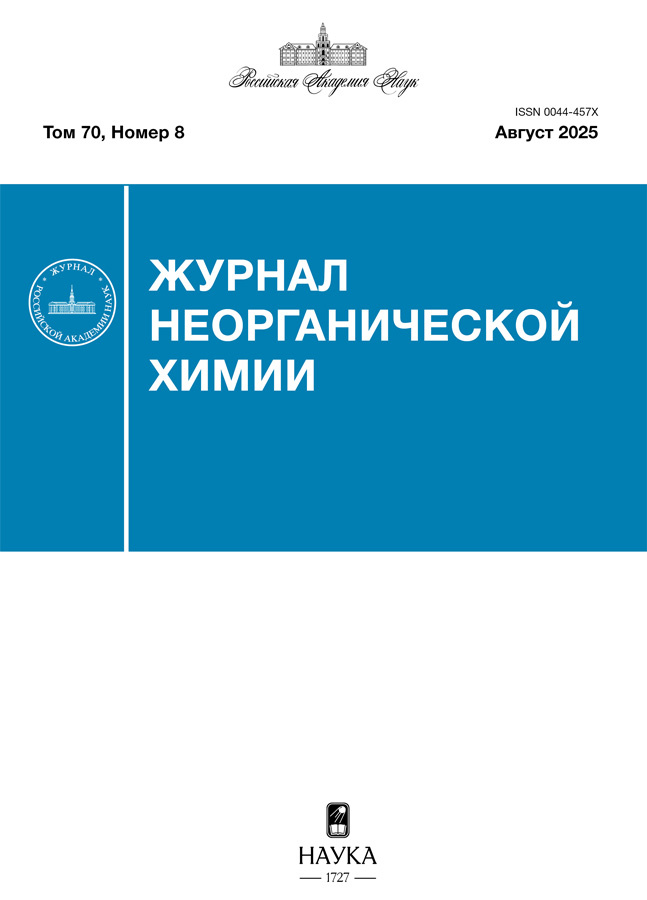Перфторциклогексаноат цинка (C6F11COO)2Zn: синтез, парообразование и оценка термодинамических характеристик
- Авторы: Малкерова И.П.1, Каюмова Д.Б.1, Ямбулатов Д.С.1, Хорошилов А.В.1, Сидоров А.А.1, Алиханян А.С.1
-
Учреждения:
- Институт общей и неорганической химии им. Н.С. Курнакова РАН
- Выпуск: Том 70, № 2 (2025)
- Страницы: 262-267
- Раздел: ФИЗИЧЕСКИЕ МЕТОДЫ ИССЛЕДОВАНИЯ
- URL: https://clinpractice.ru/0044-457X/article/view/683202
- DOI: https://doi.org/10.31857/S0044457X25020119
- EDN: https://elibrary.ru/ICFFSF
- ID: 683202
Цитировать
Полный текст
Аннотация
Методами ТГ, ДСК и масс-спектрометрии исследована гетерофазная реакция взаимодействия перфторциклогексаноата серебра с цинком и установлено, что в интервале температур 320–520 K образуется твердый перфторциклогексаноат цинка и протекает внутримолекулярная реакция образования фторида цинка. С учетом полученных экспериментальных данных рассчитаны стандартные энтальпии образования твердого комплекса цинка ΔfНo 298.15 = –5693 ± 29 кДж/моль, сублимации и образования димерных молекул Zn2(C6F11COO)4 ΔsНo Т = 190 ± 15 кДж/моль и ΔfНo Т = –11196 ± 40 кДж/моль.
Ключевые слова
Полный текст
Об авторах
И. П. Малкерова
Институт общей и неорганической химии им. Н.С. Курнакова РАН
Email: alikhan@igic.ras.ru
Россия, Ленинский пр-т, 31, Москва, 119991
Д. Б. Каюмова
Институт общей и неорганической химии им. Н.С. Курнакова РАН
Email: alikhan@igic.ras.ru
Россия, Ленинский пр-т, 31, Москва, 119991
Д. С. Ямбулатов
Институт общей и неорганической химии им. Н.С. Курнакова РАН
Email: alikhan@igic.ras.ru
Россия, Ленинский пр-т, 31, Москва, 119991
А. В. Хорошилов
Институт общей и неорганической химии им. Н.С. Курнакова РАН
Email: alikhan@igic.ras.ru
Россия, Ленинский пр-т, 31, Москва, 119991
А. А. Сидоров
Институт общей и неорганической химии им. Н.С. Курнакова РАН
Email: alikhan@igic.ras.ru
Россия, Ленинский пр-т, 31, Москва, 119991
А. С. Алиханян
Институт общей и неорганической химии им. Н.С. Курнакова РАН
Автор, ответственный за переписку.
Email: alikhan@igic.ras.ru
Россия, Ленинский пр-т, 31, Москва, 119991
Список литературы
- Ingram B.J., Gonzalez G.B., Kammler D.R. // J. Electroceram. 2004. V. 13. P. 167. https://doi.org/10.1007/s10832-004-5094-y
- Klein A., Körber C., Wachau A. et al. // J. Mater. 2010. V. 3. № 11. P. 4892. https://doi.org/10.3390/ma3114892
- Hartnagel H.L., Dawar A.L., Jain A.K. et al. Semiconducting Transparent Thin Films. Institute of Physics Publishing: Bristol, UK. 1995.
- Ginley D.S., Bright C. // MRS Bull. 2000. V. 25. P. 15. https://doi.org/10.1557/mrs2000.256
- Granqvist C.G. // Sol. Energy Mater. Sol. Cells. 2007. V. 91. P. 1529. https://doi.org/10.1016/j.solmat.2007.04.031
- Ellmer K., Klein A., Rech B. Transparent Conductive Zinc Oxide: Basics and Applications in Thin Film Solar Cells. Berlin: Springer-Verlag, Germany. 2008. https://doi.org/10.1007/978-3-540-73612-7
- Fortunato E., Ginley D., Hosono H. et al. // MRS Bull. 2007. V. 32. P. 242. https://doi.org/10.1557/mrs2007.29
- Gu F., Li C., Hu Y., Zhang L. // J. Cryst. Growth. 2007. V. 304. № 2. P. 369. https://doi.org/10.1016/j.jcrysgro.2007.03.040
- Wang G., Shen X., Horvat J. et al. // J. Phys. Chem. С. 2009. V. 113. № 11. P. 4357. https://pubs.acs.org/doi/10.1021/jp8106149
- Jogade S.M., Sutrave D.S., Gothe S.D. // Int. J. Adv. Res. Phys. Sci. 2015. V. 2. № 10. P. 36.
- Vetter S., Haffer S., Wagner T., Tiemann M. // Sens. Actuators, B. 2015. V. 206. P. 133. https://doi.org/10.1016/j.snb.2014.09.025
- Jung D., Han M., Lee G.S. // Sens. Actuators, B. 2014. V. 204. P. 596. https://doi.org/10.1016/j.snb.2014.08.020
- Wollenstein J., Burgmair M., Plescher G. et al. // Sens. Actuators, B. 2003. V. 93. P. 442. https://doi.org/10.1016/S0925-4005(03)00168-0
- Li W., Xu L., Chen J. // Adv. Funct. Mater. 2005. V. 15. P. 851. https://doi.org/10.1002/adfm.200400429
- Bhardwaj P., Singh J., Verma V. et al. // Physica B: Cond. Matter. 2025. V. 696. P. 416596. https://doi.org/10.1016/j.physb.2024.416596
- Jayaraj M.K. (Ed.). Nanostructured Metal Oxides and Devices. Materials Horizons: From Nature to Nanomaterials. 2020. https://doi.org/10.1007/978-981-15-3314-3
- Mishra S., Daniele S. // Chem. Rev. 2015. V. 115. № 16. P. 8379. https://doi.org/10.1021/cr400637c
- Hichou A.E., Bougrine A., Bubendorff J.L. et al. // Semicond. Sci. Technol. 2002. V. 17. № 6. P. 607. https://doi.org/10.1088/0268-1242/17/6/318
- Gunasekaran E., Ezhilan M., Mani et al. // Semicond. Sci. Technol. 2018. V. 33. № 9. P. 095005. https://doi.org/10.1088/1361-6641/aad2ab
- Antony A., Pramodini S., Kityk I.V. et al. // Physica E. 2017. V. 94. P. 190. https://doi.org/10.1016/j.physe.2017.08.015
- Kadi M.W., McKinney D., Mohamed R.M. et al. // Ceram. Int. 2016. V. 42. № 4. P. 4672. https://doi.org/10.1016/j.ceramint.2015.11.052
- Paramanik B., Samanta S., Das D. // Opt. Mater. 2022. V. 133. P. 112961. https://doi.org/10.1016/j.optmat.2022.112961
- Cosham S.D., Kociok-Köhn G., Johnson A.L. et al. // Eur. J. Inorg. Chem. 2015. V. 2015. № 26. P. 4362. https://doi.org/10.1002/ejic.201500536
- Bekermann D., Rogalla D., Becker H.-W. et al. // Eur. J. Inorg. Chem. 2010. № 9. P. 1366. https://doi.org/10.1002/ejic.200901037
- Успехи химии фтора. Т. I-II, перевод с англ. Термохимия органических соединений фтора / Под ред. Сергеева А.П. М.-Л. 1961.
- Karasch M. // J. Res. Nat. Bur. Stand. 1929. P. 359.
- Good W., Scott D., Waddingtion G. // J. Phys. Chem. 1956. V. 60. P. 1080.
- Morozova E.A., Dobrokhotova Zh.V., Alikhanyan A.S. // J. Therm. Anal. Calorim. 2017. V. 130. № 3. P. 2211. https://doi.org/10.1007/s10973-017-6583-y
- Kayumova D.B., Malkerova I.P., Yambulatov D.S. et al. // Russ. J. Coord. Chem. 2024. V. 50. № 3. P. 210. https://doi.org/10.1134/S1070328423601310
- Малкерова И.П., Каюмова Д.Б., Белова Е.В. и др. // Коорд. химия. 2023. Т. 49. № 11. С. 706. https://doi.org/10.31857/S0132344X22600515 EDN: NGONJB
- Gribchenkova N.A., Alikhanyan A.S. // J. Alloys Compd. 2019. V. 778. P. 77. https://doi.org/10.1016/j.jallcom.2018.11.136
- Краткая химическая энциклопедия в 5 томах. М.: Советская энциклопедия, 1967. Т. 5.
- Термические константы веществ. Справочник в 10 выпусках / Под ред. Глушко В.П. М.: ВИНИТИ, 1973. Т. 6. Ч. 2.
Дополнительные файлы














